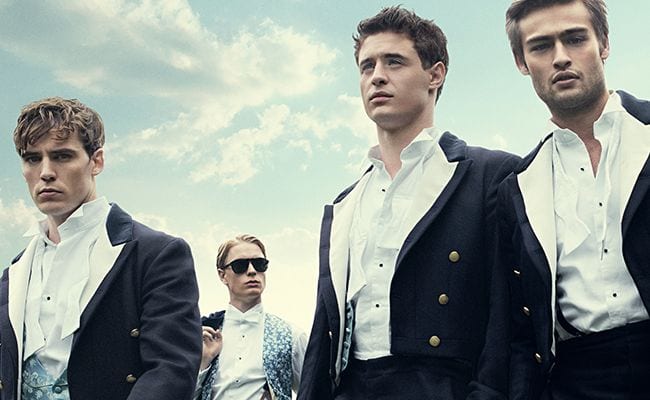
As Oxford University’s ‘Riot Club’ drinks and yells in a sleepy British pub, the audience wonders, “What’s the point?” As a film about class, set within the hallowed halls of an ancient learning institution, Riot Club has the potential to investigate the very foundations of class struggle. But instead of spending time developing relationships or examining the nature of privilege in any compelling way, Lone Scherfig’s drama seems to be more concerned with the physical grotesque — the sex, the drugs, and the high society jargon — that overpower the nuances hidden in the story’s foundation. It’s clearly a conscious choice, reflective of the characters’ own maturity and hedonism, but as a film it squanders much of its own potential as a critical look at the law-evading rich.
At the core of the film are Alistair (Sam Claflin) and Miles (Max Irons), two freshmen at Oxford University who navigate the collegiate life by searching for companionship. True to its theme, both boys come from families with a history rooted in Oxford, but their similarities seem to pit them against each other, with the laid-back Miles subjected to many of Alistair’s angry glances. After both boys are found and accepted by ‘The Riot Club’, a centuries old dining club created to honor a fallen hedonistic Lothario, a night of debauchery at a country pub descends into chaos as the boys play drinking games, snort cocaine, consort with prostitutes, and annoy the other patrons.
It’s clear that The Riot Club attempts to darkly satirize the exclusivity and privilege at the cornerstone of British culture. From the beginning, there are moments that serve to illustrate the class divide and the importance of where you come from. A night out at the pub reveals the mindsets of Guy (Matthew Beard) and George (Jack Farthing), two members of ‘The Riot Club’, as they criticize public schools in the company of Lauren (Holliday Grainger), Miles quasi-girlfriend, who reveals that her best friend went to a public school. These moments are nice little touches. They pit classes against each other in an arena that allows us think about how teenagers deal with these divides. Unfortunately, these moments are few and far between, and the bulk of the movie is dedicated to the rich boys of ‘The Riot Club’ complaining and being… well… riotous.
Sadly, promising characters quickly devolve into caricatures, making it feel cheap. The lack of subtlety throws the film into a spiral of excess that knocks over any chance at intelligent commentary as it plows forward, drunk on its own narrative, leaving a movie with an excellent set-up to become a mere comedic sketch. The fact that you could cut out more than half of the film, and still be left with the story’s essentials indicates a severe lack of narrative propulsion. Indeed, the film likes to take its time dragging out exaggerated conversations, time that would be better served by developing characters. That’s not to say the film doesn’t, at times, attempt that, but with the exception of the Greek student, they all seem interchangeable.
Of note, however, is the acting. Irons and Claflin put a lot into their performances, and it’s apparent that the problem lies not with them, nor with the supporting cast. There are many reasons why The Riot Club might not work as well as it should. As it is an adaptation of a stage play, perhaps the drama was unnecessarily ratcheted up in order to compensate. Alternatively, the writer (Laura Wade), may have been relying too much on a playwright’s mindset; that might explain the lack of moment and drawn-out scenes. It could, however, be a simple case of the play being difficult to translate into a film medium. Film by nature lacks the spontaneity of the theater; perhaps The Riot Club is ultimately better suited to that medium.
Ultimately, what holds The Riot Club back most is difficult to say. It ends up being propelled by excellent performances and solid directing. If the screenplay was a bit more polished, the satire a bit more scathing, then it would have been a great film. As it is, it just feels lacking. The DVD comes with no extras.






